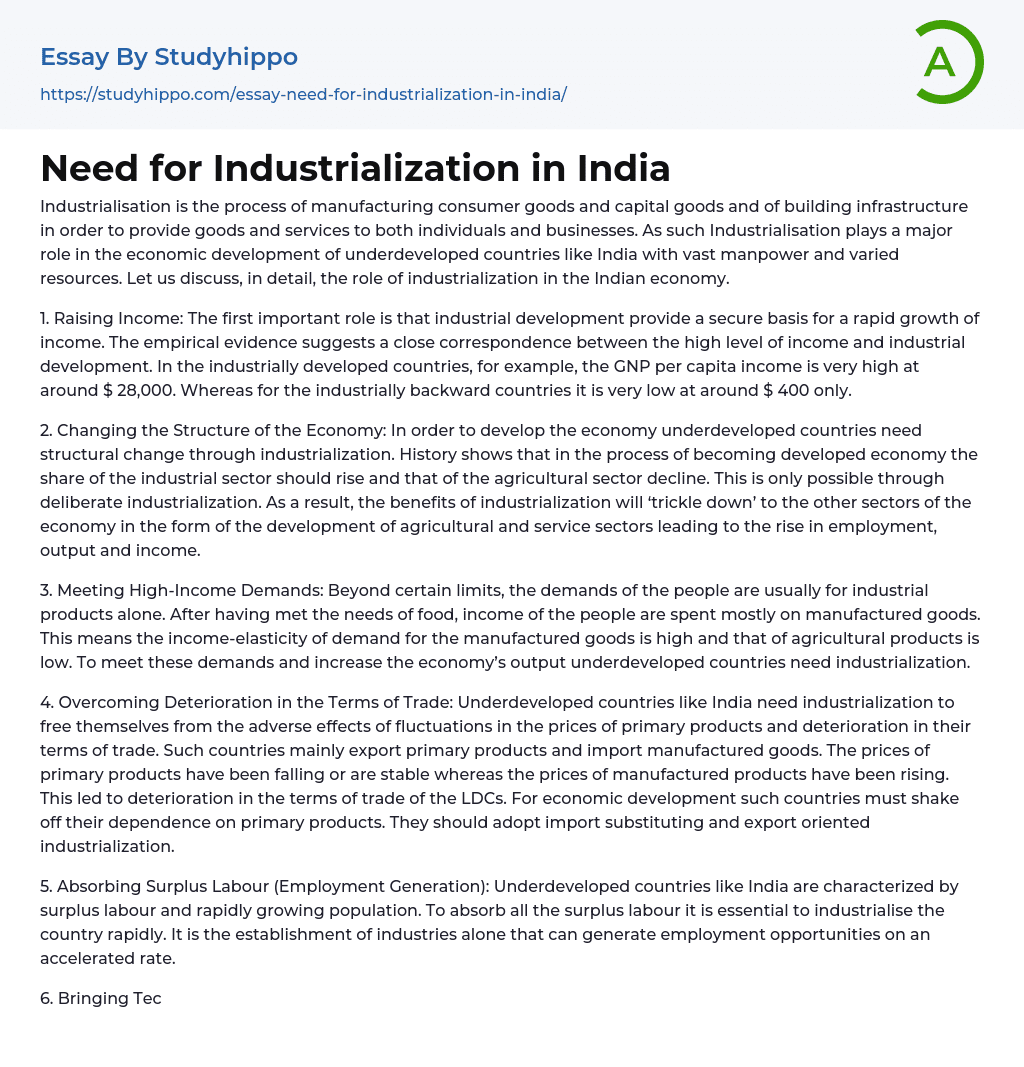Industrialisation is the process of manufacturing consumer goods and capital goods and of building infrastructure in order to provide goods and services to both individuals and businesses. As such Industrialisation plays a major role in the economic development of underdeveloped countries like India with vast manpower and varied resources. Let us discuss, in detail, the role of industrialization in the Indian economy.
1. Raising Income: The first important role is that industrial development provide a secure basis for a rapid growth of income. The empirical evidence suggests a close correspondence between the high level of income and industrial development. In the industrially developed countries, for example, the GNP per capita income is very high at around $ 28,000. Whereas for the industrially backward countries it is very low at around $ 400 only.
2. Changing the Structure of the Econ
...omy: In order to develop the economy underdeveloped countries need structural change through industrialization. History shows that in the process of becoming developed economy the share of the industrial sector should rise and that of the agricultural sector decline. This is only possible through deliberate industrialization. As a result, the benefits of industrialization will ‘trickle down’ to the other sectors of the economy in the form of the development of agricultural and service sectors leading to the rise in employment, output and income.
3. Meeting High-Income Demands: Beyond certain limits, the demands of the people are usually for industrial products alone. After having met the needs of food, income of the people are spent mostly on manufactured goods. This means the income-elasticity of demand for the manufactured goods is high and that of agricultural products is low. To meet
these demands and increase the economy’s output underdeveloped countries need industrialization.
4. Overcoming Deterioration in the Terms of Trade: Underdeveloped countries like India need industrialization to free themselves from the adverse effects of fluctuations in the prices of primary products and deterioration in their terms of trade. Such countries mainly export primary products and import manufactured goods. The prices of primary products have been falling or are stable whereas the prices of manufactured products have been rising. This led to deterioration in the terms of trade of the LDCs. For economic development such countries must shake off their dependence on primary products. They should adopt import substituting and export oriented industrialization.
5. Absorbing Surplus Labour (Employment Generation): Underdeveloped countries like India are characterized by surplus labour and rapidly growing population. To absorb all the surplus labour it is essential to industrialise the country rapidly. It is the establishment of industries alone that can generate employment opportunities on an accelerated rate.
6. Bringing Technological Progress: Research and Development is associated with the process of industrialization. The development of industries producing capital goods i.e., machines, equipment etc., enables a country to produce a variety of goods in large quantities and at low costs, make for technological progress and change in the outlook of the people. This results in bringing about an industrial civilization or environment for rapid progress which is necessary for any healthy economy.
7. Strengthening the Economy: Industrialisation of the country can provide the necessary elements for strengthening the economy. In this regard the following points may be noted.
(a) Industrialisation makes possible the production of goods like railways, dams, etc. which cannot be imported. These economic infrastructures are essential
for the future growth of the economy.
(b) It is through the establishment of industries that one can impart elasticity to the system and overcome the historically given position of a primary producing country. Thus, with industrialization we can change the comparative advantage” of the country to suit its resources and potentialities of manpower.
(c) Through industrialization the requirements for the development of agriculture can be met. For example, improved farm-implements, chemical fertilizers, storage and transport facilities, etc., appropriate to our own conditions can be adequately provided only by our own industries.
(d) The industrial development imparts to an economy dynamic element in the form of rapid growth and a diversified economic structure which make it a progressive economy.
(e) Providing for Security: Industrialisation is needed to provide for the country’s security. This consideration becomes all the more critical when some international crisis develops. In such situation, dependence of foreign sources for defence materials is a risky affair. It is only through industrial development in a big way that the national objective of self-reliance in defence materials can be achieved.
- Afghanistan essays
- Africa essays
- America essays
- Asia essays
- Australia essays
- Caribbean essays
- City essays
- Developing Country essays
- Dubai essays
- Earthquake essays
- Europe essays
- Fracking essays
- Georgia essays
- Middle East essays
- Natural Disaster essays
- New Zealand essays
- North Korea essays
- South Korea essays
- Thailand essays
- Travel essays
- American Dream essays
- Barriers To Entry essays
- Capitalism essays
- Central Bank essays
- Compensation essays
- Consumerism essays
- Economic Development essays
- Economic Growth essays
- Economic Inequality essays
- Economic System essays
- Economy essays
- Employment essays
- Export essays
- Finance essays
- Free Trade essays
- Gross Domestic Product essays
- Human Development essays
- Income Inequality essays
- Industry essays
- Inflation essays
- International Business essays
- International Trade essays
- Macroeconomics essays
- Materialism essays
- Max Weber essays
- Microeconomics essays
- Minimum Wage essays
- Monetary Policy essays
- Monopoly essays
- Pricing essays




